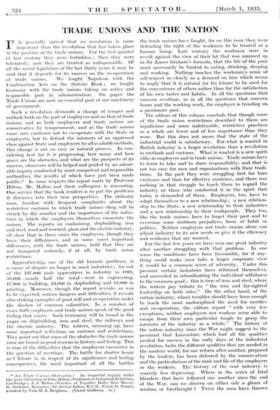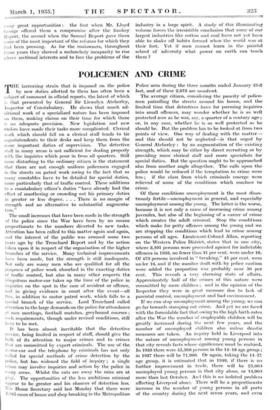TRADE UNIONS AND THE NATION
IT is generally agreed that no revolution is more important than the revolution that has taken place in the position of the trade unions. For the first quarter of last century they were forbidden ; then they were tolerated ; now they are treated as indispensable. Of all the social legislation of the last thirty years it may be said that it depends for its success on the co-operation of trade unions. We fought Napoleon with the Combination Acts on the Statute Book ; we fought Germany with the trade unions taking an active and responsible - part in administration. On paper the Trade Unions are now an essential part of our machinery of government.
Such a revolution demands a change of temper and outlook both on the part of employers and on that of trade unions, and as both employers and trade unions are conservative by temperament, and as the trade unions came into existence not to co-operate with the State or employers, but to defend the interests of an oppressed class against State and employers by all available methods, this change is not an easy or natural process. In con- sidering how far it is progressing, how many and how grave are the obstacles, and what are the prospects of its success, observers will be helped and guided by an admir- able inquiry conducted by most competent and responsible authorities, the results of which have just been made public.* In some respects the report made by Professor Hilton, Mr. Mallon and their colleagues is reassuring. One service that the book renders is to put the problems it discusses into their true perspective. The ordinary man, familiar with frequent complaints about the restrictive customs to which trade unions cling, will be struck by the number and the importance of the indus- tries -in which the employers themselves exonerate the unions. The reports on coalmining, shipbuilding, iron and steel, wool and worsted, glass and the electric industry, all show that in these cases the employers, though they have their differences, and in sonic cases important differences, with the trade unions, hold that they are not hampered seriously, if at all, by trade union restrictions.
Apprenticeship, one of the old historic problems, is a cause of dispute no longer in most industries ; for out of the 137,000 male apprentices in industry in 1920, 59,000—nearly half the total—were in engineering, 17,000 in building, 13,000 in shipbuilding and 12,000 in printing. Moreover, though the report reveals, as was to be expected, serious dangers and difficulties, it reveals also striking examples of good will and co-operation under the shadow of common calamities. In a number of cases both employers and trade unions speak of the good feeling that exists. Such testimony will be found in the pages on shipbuilding, iron and steel, the railways and the electric industry. The writers, summing up, have some important reflections on customs and restrictions. They point out that some of the obstacles the trade unions raise arc based on good reasons in history and feeling. This is true of the difficulties that the employers encounter in the question of overtime. The battle for shorter hours and leisure is, in respect of its significance and lasting consequences, the most important of all the battles * Are Trade Unions Obstructive ? An impartial inqiiiry under the joint editorship of John Hilton (Professor of Industrial Relations, Cambridge), J. J. Mallon (Warden of Toynbeo Hall), Sam Mayor, B. Seebohm Rowntree, Sir Arthur Salter, K.C.B., Frank D. Stuart; assisted by Vida M. S. Heigham. (Victor Gollancz. 5s.) the trade unions have fought, for on this issue they were defending the right of the workman to be treated as a human being. Last century the workmen were in revolt against the view of their lot that was summed up in Sir James Graham's formula, that the life of the poor must necessarily be limited to eating, drinking, sleeping and working. Nothing touches the workman's sense of self-respect so closely as a demand on him which seems to imply that it is natural for his leisure to be used for the convenience of others rather than for the satisfaction of his own :tastes and habits. In all the questions that concern overtime, as in all the questions that concern hours and the working week, the employer is treading on a passionate past.
The editors of this volume conclude that though some of the trade union restrictions described to them are injudicious and some indefensible, restrictive practices as a whole are fewer and of less importance than they were. But this does not mean that the state of the industrial world is satisfactory. For what is wanted in British industry is a larger revolution than a revolution in methods and customs. What is wanted is a new spirit alike in employers and in trade unions. Trade unions have to learn to take and to share responsibility, and that is not too easy for men and organizations with their tradi- tions. In the past they were struggling first for bare existence and then for effective existence, and there was nothing in that struggle to teach them to regard the industry or those who conducted it in the spirit that today is demanded of them. Employers, too, have to adapt themselves to a new relationship ; a new relation- ship to the State, a new relationship to their industries and a new relationship to their workpeople. They too, like the trade unions, have to forget their past and to overcome some stubborn prejudices, born of habit or politics. Neither employers nor trade unions alone can adjust industry to its new needs or give it the efficiency and resilience that are wanted.
For the last few years we have seen one great industry after another struggling with that problem: In one sense the conditions have been favourable, for if any- thing could make men take a larger corporate view it would be a common sense. of adversity. Under this pressure certain industries have reformed themselves, and succeeded in subordinating the individual selfishness to the common good ; this is true of iron and steel, where the writers pay tribute to " the wise and far-sighted leadership on both sides." On the other hand, of the cotton industry, whose troubles should have been enough to teach the most undisciplined the need for sacrifice and co-operation, the editors report " with very few exceptions, neither employers nor workers seem able to escape from their own particular tangle to grasp the interests of the industry as a whole." The history of the cotton industry since the War might suggest to the pessimist that Lancashire, which had all the qualities needed for success in the early days of the industrial revolution, lacks the different qualities that are needed in the modern world, for one reform after another, prepared by the leaders, has been defeated by the conservatism and the particularism of the rank and file of the employers or the workers. The history of the coal industry is scarcely less depressing. Where in the series of fatal blunders that have followed one another since- the end of the War, can we discern on either side a gleam of wisdom or forethought ? Twice the men have thrown a way great opportunities : the first when Mr. Lloyd George offered them a compromise after the Sankey Report, the second when the Samuel Report gave them some of the most important of the reforms for which they had been pressing. As for the coalowners, throughout those years they showed a melancholy incapacity to rise above sectional interests and to face the problems of the industry in a large spirit. A study of this illuminating volume forces the .irresistible conclusion that some of our largest industries like cotton and coal have not yet been able to shake off habits formed when the world was at their feet. Yet if men cannot learn in the painful school of adversity what power on earth can teach them ?



























































 Previous page
Previous page